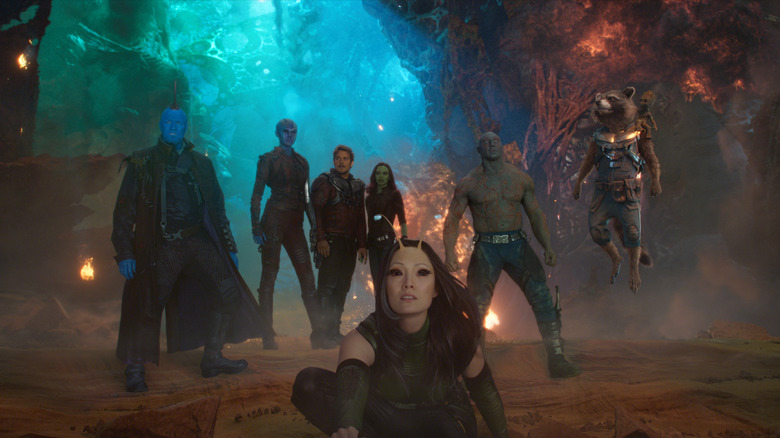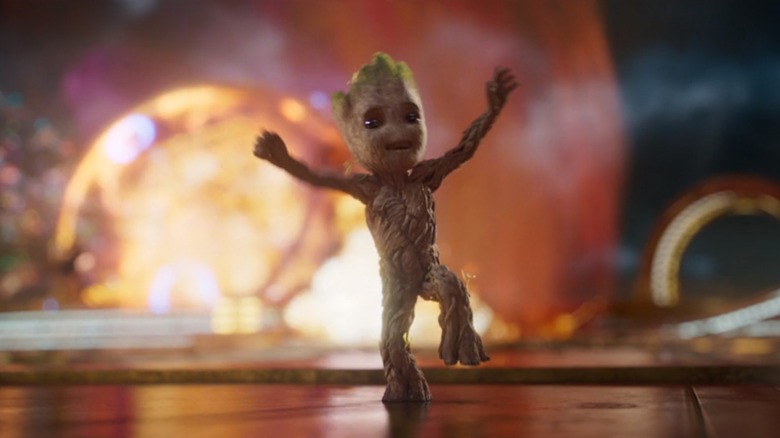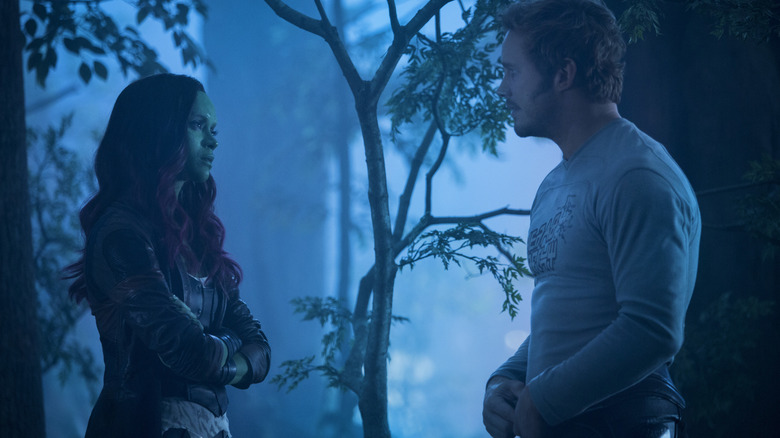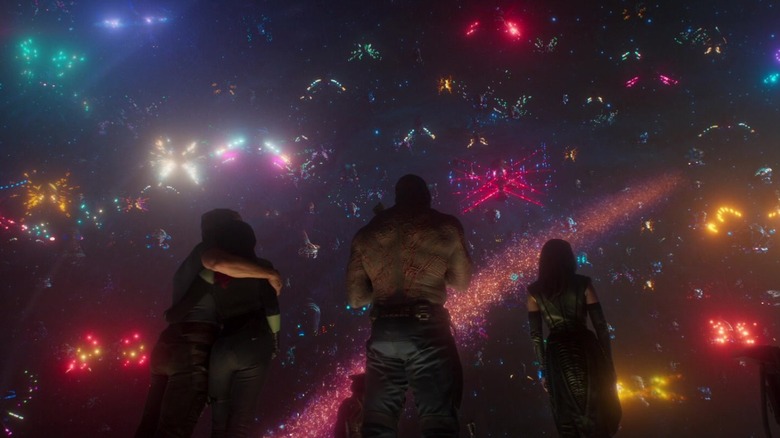Guardians Of The Galaxy Vol. 2 Is The Best MCU Movie And It's About Time We Admit It
After the roughly 15 years that the Marvel Cinematic Universe has existed as a franchise, it feels like the studio's movies can be neatly summarized into a few groups. You have your reliable crowd-pleasers and buzzy crossovers — 2012's "The Avengers," "Infinity War" and Endgame," "Spider-Man: No Way Home," and the like — that deliver more or less what audiences expected, offering something for everyone and raking in historic box office profits as a result. Then there are the polarizing ones, movies like "Iron Man 3" and "Avengers: Age of Ultron" and "Doctor Strange in the Multiverse of Madness," all of which alienated certain segments of the fandom because of controversial creative choices made by strong-willed directors who were never going to completely toe the company line.
But there's an even more interesting category of MCU film that feels like a perfect amalgamation of both. James Gunn's "Guardians of the Galaxy" movies exist in an odd space, where they were both critically acclaimed and widely embraced by general audiences upon release ... but now, especially in light of the writer/director "defecting" to rival DC, certain parts of the fandom (read: the extremely online ones) would have you believe that neither film has much to offer. I (and many others) would beg to differ.
Not only do they remain two of the most personality-driven, filmmaker-friendly, and overall well-made films in all the MCU, driving up the hype surrounding the upcoming threequel later this week, but I'd go so far to say that "Guardians of the Galaxy: Vol. 2" continues to stand out as the absolute best of the bunch. If that seems like a hot take or a contrarian opinion for the sake of it, well, it shouldn't. Here's why.
The ultimate hangout movie
Who says blockbusters have to be little more than plot delivery services? Sometimes, we just want an excuse to spend time with some of the most colorful and charismatic characters we've ever met. There's a long and storied history of hangout movies that capture that drunken feeling of bouncing off several friends during long and unplanned nights on the town, but rarely have superhero movies featured the kinds of heroes we could actually imagine doing that with. Until "Vol. 2," that is.
Perhaps the greatest strength of "Guardians of the Galaxy Vol. 2" is that it sacrifices plot in favor of character-focused "vibes." With their origin story taken care of in the first "Guardians," the sequel is free to dive much deeper and explore rich, meaningful character pairings and dynamics. Peter Quill (Chris Pratt) and Rocket (Bradley Cooper) constantly trading insults, Quill and Gamora (Zoe Saldaña) going full will-they/won't-they, Gamora and Nebula (Karen Gillan) becoming true sisters, and even Rocket and Yondu (Michael Rooker) coming to an understanding of one another all intersect and build to surprising and effective thematic conclusions.
That's because, compared to the rest of the MCU, "Vol. 2" simply couldn't be less interested in Infinity Stones or the multiverse or whatever other overarching plot devices were needed at the time to build another link in the chain leading to the arrival of the ultimate big bad, Thanos. In fact, as much as the various Guardians namedrop the unseen Mad Titan throughout the sequel, it's only ever with the intent of exploring the psychological and physical abuse he inflicted upon his "daughters" Gamora and Nebula. And that's the key to it all, as it turns out.
Every decision made in this script is in service of character and story ... not franchise-building.
An unspoken thing
Remember when the MCU used to make room for love stories? I'm not just talking about throwing in a weirdly obligatory kiss every now and then (Sharon Carter, you deserved so much better than "Captain America: Civil War" had to offer!) or merely coasting on the chemistry between Robert Downey, Jr. and Gwyneth Paltrow without ever actually evolving their characters' relationship. I mean a true romance that gives audiences something to care about beyond the typical spectacle overload.
James Gunn surely noticed that the rest of the MCU was lacking in this regard when he set out to write "Vol. 2" and, specifically, the "unspoken thing" between Gamora and Quill. Early on, he dedicates valuable screen time to quiet moments such as Drax (Dave Bautista) describing love to Quill in terms of "those who dance, and those who do not," or Gamora and Quill taking a walk in the woods to talk about Quill's daddy issues (and David Hasselhoff). Though laced with Gunn's usual sense of irreverent humor, these scenes help establish the emotional foundation that makes us invested in what happens to them later on. We want to see Quill overcome his arrested development and we want to see Gamora let her guard down and learn to open herself up to others. Watching Quill and Gamora dance on a balcony (and their subsequent argument over Quill's father, the suspicious Ego played by Kurt Russell) may not be the most thrilling or action-packed highlight in the franchise, but it's precisely the kind of sincere and invaluable emotional beat that sets "Vol. 2" apart from the crowd.
By the time Gamora finally allows herself to communicate her feelings to Quill in the end, "Vol. 2" clears the shockingly low bar of delivering one of the MCU's best romances.
A blockbuster with heart
On the surface, "Vol. 2" is utterly ridiculous. The inciting action of the entire movie involves Rocket stealing some batteries for the heck of it. Quill's journey requires coming to terms with being, essentially, an immortal god. Gamora and Nebula's entire conflict boils down to a sibling rivalry. But by treating all of these instances with complete earnestness and without a trace of self-consciousness, James Gunn does the impossible and makes each and every Guardian's emotional arc land with full force.
What Gunn does best, after all, is turning larger-than-life and utterly flawed heroes into actual human beings when we least expect it. "Vol. 2" suddenly turns Rocket and Yondu's tendency to act like total a**holes into a profoundly shared connection between them, revealing that they hide the emptiness in their heart underneath a rough and unlikable exterior that pushes their closest friends away. Drax and the empath Mantis (Pom Klementieff) are given texture and dramatic weight to their dynamic that, though it gets a little mean-spirited at times, pays off beautifully when Drax reminisces about the daughters he lost. When we get to the montage where Quill relives memories with his late mother and the rest of the Guardians in happier times at the most pivotal moment of the third act, it hits as hard as it does because Gunn did all the work beforehand to remind us why we care about them in the first place.
No other sequence in the franchise has wrung more tears out of me than Yondu's sacrifice and subsequent funeral. Rocket's quiet apology, Yondu's redemption among the Ravagers, Gamora and Nebula sharing the briefest of hugs, and Gamora and Peter's romance all conclude flawlessly. But ending an entire MCU movie on a shot of Rocket's tearstained face? That's cinema.



